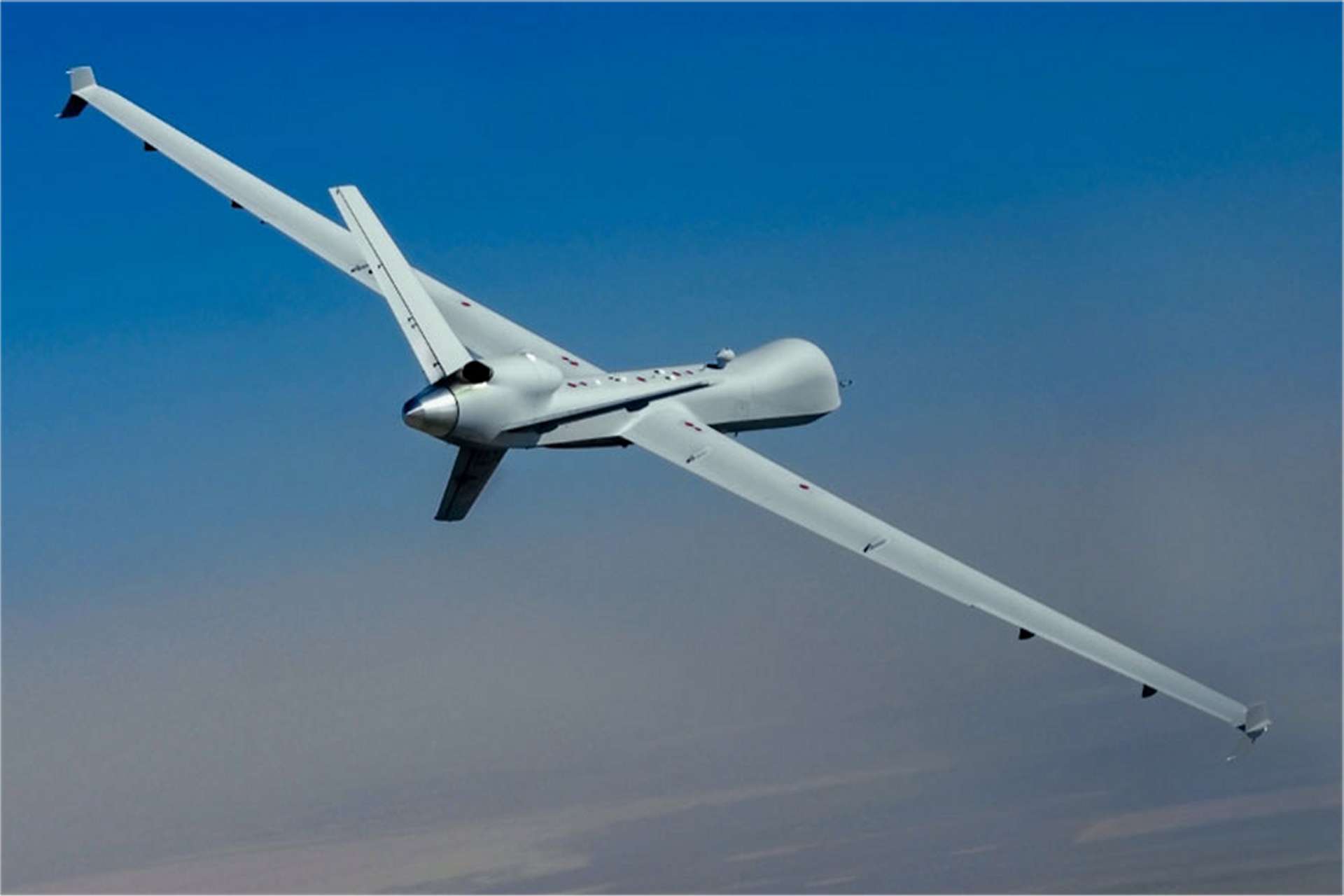Royal Netherlands Air Force Conducts First MQ-9 Reaper Drone Flight Over Dutch Airspace

{loadposition bannertop}
{loadposition sidebarpub}
The Royal Netherlands Air Force (RNLAF) has taken a decisive step in modernizing its military capabilities with the first flight of an MQ-9A Block 5 Reaper over Dutch airspace. This unmanned aerial vehicle (UAV), renowned for its surveillance and reconnaissance capabilities, conducted a training mission over the northern regions of the Netherlands and the adjacent maritime area, marking a historic moment for Dutch defense.Follow Army Recognition on Google News at this link
General Atomics MQ-9A Reaper Drone (Picture source : General Atomics)
The inaugural flight of the MQ-9 Reaper is part of a series of practical exercises aimed at integrating these drones into national and international defense strategies. This training program enables military personnel to familiarize themselves with the coordination of complex operations involving fighter jets, ground troops, and air traffic controllers. This mission, part of the “Weapons Instructor Course,” highlights the crucial role of the MQ-9 in supporting ground forces. With its ability to identify targets and provide real-time information, this UAV plays an essential role in modern combat scenarios. The RNLAF relies on these exercises to prepare its forces to respond effectively to future defense missions, both within Dutch territory and internationally, as part of NATO commitments.
Since April 2022, the Netherlands has deployed its MQ-9 Reapers as part of allied defense efforts, notably in Romania. However, the use of these drones in Dutch airspace represents a new phase in the integration of this technology into the national arsenal. Stationed at Leeuwarden Air Base, these aircraft are at the heart of personnel training programs, while also fostering coordination with international partners and national agencies such as air traffic control.
The MQ-9 Reaper plays a key role in the RNLAF’s long-term operational objectives. Its main asset lies in its ability to gather real-time intelligence, a crucial component in modern warfare where information superiority often determines the outcome of operations. The current Dutch fleet consists of four MQ-9 Reapers, with more units on order. Although these drones are not yet armed, they already offer critical capabilities for surveillance, target identification, and communication support.
The MQ-9 Reapers, manufactured by General Atomics Aeronautical Systems, are advanced drones designed for long-duration, high-altitude missions. Compared to their predecessors, the MQ-1 Predators, the Reapers feature more powerful engines and the ability to carry a larger payload, enabling them to perform a wider range of missions, including future offensive operations once armed. Currently, the Dutch MQ-9s are equipped with synthetic aperture radar and specialized ground search radar, making them particularly suited for maritime and ground surveillance missions.
The Netherlands plans to arm its fleet of MQ-9 Reapers, which will mark a significant turning point in its military capabilities. The ability to arm these drones will provide the RNLAF with a flexible, remote-controlled platform capable of neutralizing threats from a distance. This capability, combined with their endurance and sophisticated sensors, makes the MQ-9 a central element of Dutch defense strategy.
The integration of the MQ-9 Reapers into Dutch military operations reflects a forward-looking approach to modern warfare. These drones, with their ability to provide real-time intelligence and operate in cooperation with international allies, are poised to play a leading role in the country’s defense missions. By 2023, the MQ-9 Reaper fleet is expected to reach full operational capability, marking an important milestone for the RNLAF.
This step not only underscores the technical progress made by the Netherlands but also their commitment to modernizing their armed forces to meet the challenges of modern warfare. By equipping themselves with advanced unmanned systems and strengthening international cooperation, the Netherlands is positioning itself as a key player in defense operations within NATO and beyond.
With this new capability, the RNLAF demonstrates its determination to prepare for future conflicts, where drones, information dominance, and international coordination will play a decisive role. The MQ-9 Reaper thus represents a major advancement in the country’s defense strategy, offering promising prospects for the future of national and international security.

{loadposition bannertop}
{loadposition sidebarpub}
The Royal Netherlands Air Force (RNLAF) has taken a decisive step in modernizing its military capabilities with the first flight of an MQ-9A Block 5 Reaper over Dutch airspace. This unmanned aerial vehicle (UAV), renowned for its surveillance and reconnaissance capabilities, conducted a training mission over the northern regions of the Netherlands and the adjacent maritime area, marking a historic moment for Dutch defense.
General Atomics MQ-9A Reaper Drone (Picture source : General Atomics)
The inaugural flight of the MQ-9 Reaper is part of a series of practical exercises aimed at integrating these drones into national and international defense strategies. This training program enables military personnel to familiarize themselves with the coordination of complex operations involving fighter jets, ground troops, and air traffic controllers. This mission, part of the “Weapons Instructor Course,” highlights the crucial role of the MQ-9 in supporting ground forces. With its ability to identify targets and provide real-time information, this UAV plays an essential role in modern combat scenarios. The RNLAF relies on these exercises to prepare its forces to respond effectively to future defense missions, both within Dutch territory and internationally, as part of NATO commitments.
Since April 2022, the Netherlands has deployed its MQ-9 Reapers as part of allied defense efforts, notably in Romania. However, the use of these drones in Dutch airspace represents a new phase in the integration of this technology into the national arsenal. Stationed at Leeuwarden Air Base, these aircraft are at the heart of personnel training programs, while also fostering coordination with international partners and national agencies such as air traffic control.
The MQ-9 Reaper plays a key role in the RNLAF’s long-term operational objectives. Its main asset lies in its ability to gather real-time intelligence, a crucial component in modern warfare where information superiority often determines the outcome of operations. The current Dutch fleet consists of four MQ-9 Reapers, with more units on order. Although these drones are not yet armed, they already offer critical capabilities for surveillance, target identification, and communication support.
The MQ-9 Reapers, manufactured by General Atomics Aeronautical Systems, are advanced drones designed for long-duration, high-altitude missions. Compared to their predecessors, the MQ-1 Predators, the Reapers feature more powerful engines and the ability to carry a larger payload, enabling them to perform a wider range of missions, including future offensive operations once armed. Currently, the Dutch MQ-9s are equipped with synthetic aperture radar and specialized ground search radar, making them particularly suited for maritime and ground surveillance missions.
The Netherlands plans to arm its fleet of MQ-9 Reapers, which will mark a significant turning point in its military capabilities. The ability to arm these drones will provide the RNLAF with a flexible, remote-controlled platform capable of neutralizing threats from a distance. This capability, combined with their endurance and sophisticated sensors, makes the MQ-9 a central element of Dutch defense strategy.
The integration of the MQ-9 Reapers into Dutch military operations reflects a forward-looking approach to modern warfare. These drones, with their ability to provide real-time intelligence and operate in cooperation with international allies, are poised to play a leading role in the country’s defense missions. By 2023, the MQ-9 Reaper fleet is expected to reach full operational capability, marking an important milestone for the RNLAF.
This step not only underscores the technical progress made by the Netherlands but also their commitment to modernizing their armed forces to meet the challenges of modern warfare. By equipping themselves with advanced unmanned systems and strengthening international cooperation, the Netherlands is positioning itself as a key player in defense operations within NATO and beyond.
With this new capability, the RNLAF demonstrates its determination to prepare for future conflicts, where drones, information dominance, and international coordination will play a decisive role. The MQ-9 Reaper thus represents a major advancement in the country’s defense strategy, offering promising prospects for the future of national and international security.





